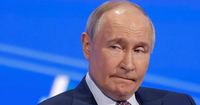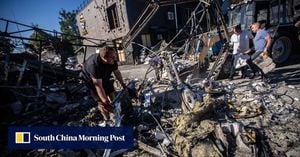In late January 2025, a significant warning echoed through the halls of the European Parliament. James Appathurai, NATO's deputy assistant secretary-general for innovation, hybrid, and cyber, highlighted the escalating threat posed by Russia's hybrid warfare during a critical hearing. He laid bare incidents of sabotage across NATO countries in recent years, including train derailments, arson, and even assassination plots against key figures. This growing menace has intensified since Russia's invasion of Ukraine in 2022, with sabotage operations linked to Russian intelligence recorded in 15 countries. Appathurai firmly stated that it was time for NATO to adopt a war footing in response to these alarming developments.
As the world watched, the tone from the Trump administration was markedly different from that of NATO’s call to arms. Amidst Trump's administration's dramatic overtures to Russian President Vladimir Putin, the urgency surrounding the NATO warnings faded into the background. The administration seemed eager to normalize relations with Russia, even as the evidence of sabotage and espionage unfolded, raising concerns about a fractured approach in the face of a unified international threat.
Amidst these geopolitical shifts, the skepticism towards American intentions remains strong within Russia's security circles. Fyodor Lukyanov, a voice often heard from the Kremlin, declared that the chance for a new global arrangement akin to the historic Yalta conference was nil. Dmitry Suslov, another prominent figure in Russian foreign policy, echoed similar sentiments, cautioning that any thaw in U.S.-Russian relations would likely be short-lived, especially with the impending U.S. midterm elections in 2026 on the horizon. This deep-rooted mistrust underscores the Kremlin's strategy, reinforcing its will to maintain a hybrid warfare approach.
Historically, since its annexation of Crimea in 2014, Russia has employed various forms of hybrid warfare, including sabotage operations beyond its borders. In early 2024, the audacious assassination attempt on Armin Papperger, the CEO of Rheinmetall—Germany’s largest arms manufacturer—underscored the gravity of the situation. The realization of how deeply embedded Russian intelligence network has become across Europe raises urgent questions about the West’s readiness to respond. In March 2024, authorities arrested two British men after they set fire to a Ukrainian-linked warehouse in London, a plot associated with the notorious Wagner paramilitary group. Such incidents serve as reminders that Russian interference remains pervasive.
As Europe grapples with these challenges, intelligence officials suspect that Russian security services may be manipulating political landscapes ahead of elections. In the lead-up to Germany’s federal election in February 2025, civilian attacks linked to Afghan and other immigrant groups raised eyebrows. German intelligence suggested that Russian operatives might have instigated these incidents to bolster support for far-right parties opposing aid to Ukraine, showing how intricate and malevolent Russia’s strategy can be.
Moreover, tactics such as the recruitment of local officials and youth for sabotage missions reflect an alarming transformation in Russian operations. Appathurai's briefing illustrated that Russian intelligence agencies were increasingly likely to enlist unwitting participants to lessen accountability for their actions. Reports confirm that social media tools are being utilized to recruit individuals for specific operations, making it more challenging to counter these acts effectively. This ominous shift in strategy invites further scrutiny of intelligence responses across Europe.
In an unexpected layer of complexity, the Kremlin is reportedly employing hostages as geopolitical leverage more than ever before. Since the onset of the Ukraine invasion, the detention of foreigners—including numerous Americans—has surged. From wrongful detentions portraying a facade of legality to outright hostage-takings, Russia’s Federal Security Service now sees foreign captives as bargaining chips in negotiations. This reinvention of traditional diplomacy intricately ties back to the ongoing Ukraine conflict, shifting the power dynamics in global conversations.
The backdrop of these developments casts a long shadow over security strategies in Europe. Concerns grow regarding the potential need for a cohesive response to counter Russian hybrid warfare and espionage. Instances from the past reflect how previous misjudgments led to significant intelligence failures — an urge to avoid repeating historical mistakes looms large as Trump’s realignment with Russia creates disarray within the U.S. intelligence community.
The evolution of Russia's operations suggests a sophisticated, multifaceted approach to undermining democracy and stability in Europe. By outsourcing sabotage tactics to local actors, Russian intelligence aims to conceal its fingerprints while achieving its broader strategic goals. The lessons drawn from the tumultuous years following the Cold War highlight the critical need for vigilance. As geopolitical undercurrents shift, so too must the strategies aimed at mitigating risks posed by a resurging Russian aggression.
European governments appear to recognize the necessity of enhancing security measures. Initiatives are springing up to secure vital infrastructure against possible attacks and counteract the systematic rise of Russian operations. Nevertheless, the challenge remains — as Europe contemplates rolling back Russian influence, ensuring that policies and preparedness remain effective in safeguarding against sabotage must remain at the forefront, serving as a bulwark against an ever-evolving threat landscape.
The complexities of modern warfare in the context of hybrid tactics, espionage, and misinformation weave a narrative that proves concerning yet critical to understand. As important discussions progress over strategies to counter this multifaceted threat, the stakes surrounding geopolitical maneuvering grow larger.
The evolving situation serves as a reminder of the importance of cooperation and solidarity in dealing with global security threats. The need for unity among allies never has been more pressing as nations grapple with the intentions behind Russia's aggressive posturing and strategic operations. In this new Arctic reality shaped by Trump’s diplomacy, vigilance and preparation will be the key to defending against further encroachments.






